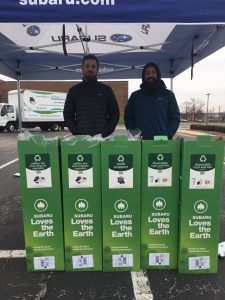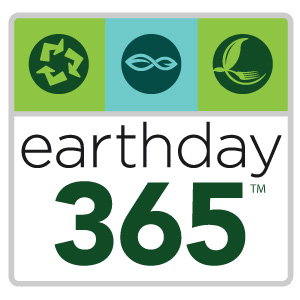Updates To Your Blue Bin
Within the last year, there have been some major changes to the back end of the recycling industry, and they are beginning to effect residents and businesses here in St. Louis.
Before 2018, much of what has been collected from our blue bins, such as mixed paper and some lower quality plastics, have been shipped to China. The levels of contamination mixed with recyclables from plastic bags, food waste, and even hazardous materials created serious environmental and health issues for China, who decided in early 2018 to refuse this low quality, potentially dangerous material. Before the ban, up to 43% of the recycling we shipped to China was contaminated waste. At the beginning of the year, China imposed very strict rules on imports, and put an outright ban on other recycling imports.
These new rules impacted the American recycling industry, from the Materials Recovery Facilities (MRFs) to the haulers, to those in recycling education, like the staff here at St. Louis Earth Day. Recyclers had to scramble to find new places to sell their sorted recyclable materials. Some of those materials, such as stacks of mixed paper, became damaged by rain while new markets were being identified, Wet paper cannot be recycled, so some of these materials had to go to a landfill.
Recycling is a business, and the materials are a commodity used to create new products. When the commodities are damaged, they become waste. This is why it is more important than ever to keep your recyclables empty, clean, and dry, and to only recycle material that is accepted by your recycling company. Unfortunately, contamination is at the root of this new problem, and it is part of the reason why residents and businesses might see some increases on their recycling bills and stricter adherence to what can go in their blue bin. Accepted materials haven’t really changed that much since 2004, but enforcement and education have been a little lax in some areas.
The biggest issue negatively impacting our current recycling system is not China’s new restrictions; it’s residents throwing trash in recycling. This is often called “wish-cycling,” when people throw things in recycling that they want to be recyclable, but aren’t – at least not in single stream blue bins. Common items that people wish-cycle are anything plastic, plastic bags (including trash bags), styrofoam, coffee cups, and straws.
Don’t panic – your recyclable materials are still being recycled. Most recyclable materials were not directly affected by China’s bans, and those that were (like mixed paper) have been rerouted to new markets in different parts of the world, like India, Vietnam, and Korea. We are lucky to have facilities in our region that do a great job of separating out the trash from the good stuff. Thanks to them, nearly every recyclable material that makes it to a recycling center gets recycled – as long as it isn’t too contaminated – including mixed paper!
St. Louis Earth Day stays in direct communication with the two Material Recovery Facilities in our region to keep abreast of recycling news so we can inform you of changes as they arise. Our local MRFs have always made sure to ship high-quality products with low contamination, but even they have been impacted by these changes. Here is the most recent update: our recycling facilities have responded to the bans by trying to improve their (already impressive) operations – adding people and slowing down lines – but even with these improvements, they are unable to meet China’s standards of less than .5% contamination. One of the outcomes of this situation is that mixed paper prices have plummeted and recycling has become more expensive.
You have the power to keep recycling strong and viable by recycling right! Never put plastic bags, styrofoam, paper cups, or food in your recycling bin. Use the St. Louis City Recycles handy guide to see what goes in your single-stream recycling bin – and make sure your bin has a recycling label on it, as some blue bins are actually landfill dumpsters. You can even check their database to see where to recycle items that don’t go in your blue bin but can be recycled another way.
And remember: Reduce, Reuse, and Recycle are in that order for a reason! Try to reduce the amount of non-recyclable plastics and other materials you use, try reusable items or reuse the items you buy before resorting to recycling – the last “R.”
You can also bring some of your Hard to Recycle items – stuff that never goes in the blue bin – to our next Recycling Extravaganza on June 30th at Bishop DuBourg High School from 9-11 am. This recycling event will have the flavor of our annual Recycling Extravaganza held every April, but will be smaller and will focus on electronics, paper shredding, car seats, cell phones, Terracycle items, and clothing.

Terracycle items that never go in the blue bin, like snack wrappers, at the Recycling Extravaganza.
See below for a list of common recycling mistakes, curated by Bob Henkel, Recycling On the Go’s Program Director:
- Plastic bags and film, any flexible plastic that acts like paper, flat lids, juice or soup pouches, plastic sleeve like name tag holders, etc.
- Styrofoam in any shape or size.
- Small stuff less than 3″ including all plastic utensils, most plastic portion cups, and straws.
- Large plastics bigger than a 5 gallon bucket.
- Non-container plastics including zip ties, garden hoses, toys, bread trays, picture frames, and clocks.
- Non-containers including everything leftover from an estate sale, tools, hardware, ammunition, rope, food waste, and sporting equipment (bowling balls, bats, soccer balls, etc.).
- Paper contaminated with food waste or bodily fluids (paper towels, paper plates, tissues, etc.).
- ALL Paper cups have glue and interior linings that can’t be broken down because they were designed that way. Hooray for technology and the paper drinking cup! Boo to having to throw it away in the trash!
- Small pill bottles – these are too tiny for recycling systems!



